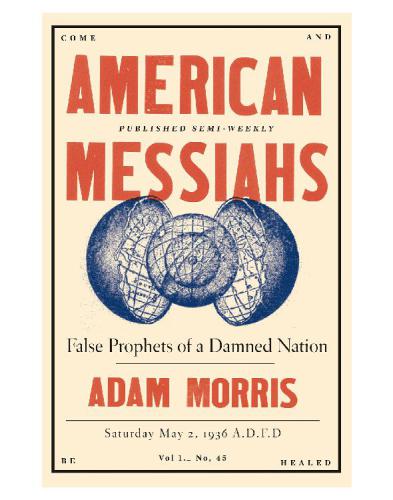
American Messiahs
False Prophets of a Damned Nation
کتاب های مرتبط
- اطلاعات
- نقد و بررسی
- دیدگاه کاربران
نقد و بررسی

Independent scholar Morris considers the Puritans, who came to America to reestablish the "pure" Christianity of the early church based on ideals of mutual aid and equal acceptance, in this examination of the history of messianic movements. He details how eclectic leaders, their followers, and movements often appealed to the highest tenets of equality, racial justice, gender parity, and shared wealth. In an early example, he describes how Jemima Smith in 1776 claimed she had died and been reborn as the Public Universal Friend, founding an itinerant public ministry, dressed as a man, to establish the New Jerusalem. He continues to trace the lineage of messianic movements up to Jim Jones and the Peoples Temple massacre in 1978. America's long tolerance of religious cults almost disappeared after this tragedy when an anticult mentality developed. The book closes with a look at the current singularity movement, which melds messianic tropes with technology to claim that humans in union with artificial intelligence will become software and live forever. VERDICT Scholars of American religious history will appreciate this meticulously crafted account.--Judy Solberg, Sacramento, CA
Copyright 1 Library Journal, LLC Used with permission.
January 15, 2019
A detailed account of messianic movements in America.On Nov. 18, 1978, more than 900 people died at Jonestown, Guyana, a remote settlement of the Peoples Temple cult led by self-styled messiah Jim Jones. This mass murder-suicide, the largest single loss of American civilian life in a deliberate act until 9/11, serves as a gruesome denouement in this new study, in which independent scholar Morris analyzes a largely forgotten chapter in American history. From Jones to Mother Ann Lee to "Walla Walla Jesus," charismatic would-be prophets have established quasi-communist settlements as correctives to the racism, misogyny, rampant individualism, and capitalist greed they believed have characterized American society. To further foster this defiance of mainstream America, most of the communities also shared an aversion to the nuclear family, with celibacy frequently promoted "as a rejection of marriage, childbearing, and traditional kinship structures." Morris is at his best when he discusses the man who arguably embodied these tenets more than anyone else: Father Divine (c. 1876-1965), a black spiritual leader and civil rights advocate. Father Divine was an important and influential figure in his day, yet his controversial views on family--followers were expected to change their names and leave behind wives, husbands, and children once they joined his movement--ensured his virtual erasure from the nation's collective memory. Unfortunately, the rest of the chapters are somewhat dry, scholarly, and jargon-laden. Moreover, the brevity of many of the chapters impedes the narrative flow, and the brief epilogue would benefit from more information on post-Jonestown cults (David Koresh and the Branch Davidians receive only one paragraph). Ultimately, the book should serve as a useful reference for students of messianic movements and the history of American religion in general, but nonscholarly readers may lose interest at some point in the narrative.An informative and occasionally enlightening survey of American messianic movements, but it will likely have limited appeal among general readers.
COPYRIGHT(2019) Kirkus Reviews, ALL RIGHTS RESERVED.

December 15, 2018
Most cultural historians see mass delusion in the murder-suicide of the fanatics who perished with the Reverend Jim Jones in Guyana in 1978. Morris sees much more. In Jones, he discerns an American messiah whose social gospel traces back to Jemima Wilkinson and Ann Lee, whose messianic leadership inspired the Shaker movement. The Shakers disappeared, but Morris faults religious historians for not recognizing the repeated reemergence of kindred communities of messianic socialism. Readers learn, for instance, about the Poet, Thomas Luke Harris, leader of group seances among his Apostolic Brotherhood; about Dr. Cyrus Teed, known as Koresh to followers, who quivered at his apocalyptic jeremiads; about George Baker, an African American messiah who, as Father Divine, celebrated energized communion services that anticipated the civil rights movement. Though they will recognize linkages between Jones and his predecessors, readers may marvel that because those messiahs rejected capitalism and the traditional nuclear family, Morris actually regards Jones' followers as representative of a truer American Christianity than that found among conservative churchgoers. Astonishing sympathy for a lethal cult.(Reprinted with permission of Booklist, copyright 2018, American Library Association.)

























دیدگاه کاربران